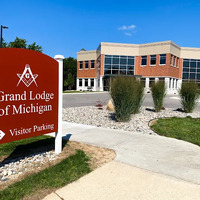-
Official Name
-
Detroit 2
-
Body Type
-
Blue Lodge
-
Date Chartered
-
September 5, 1821
-
Lodge Address
-
500 Temple St. Detroit, MI 48201
-
Historical Summary
-
Detroit Lodge No. 2, Free & Accepted Masons, holds the distinction of being Michigan's second oldest continuously operating Masonic lodge. Its story begins on September 5, 1821, when it was warranted by the Grand Lodge of New York as Detroit Lodge No. 337. Situated in the strategically important frontier settlement of Detroit, it quickly became a key center for Masonic activity.
A significant early accomplishment of Detroit Lodge No. 337 was its instrumental role as one of the five founding lodges that convened to establish the first Grand Lodge for the Territory of Michigan in June 1826. This demonstrated considerable initiative and a commitment to organizing the growing Masonic presence in the region. When the current Grand Lodge of Michigan was formally organized and recognized in 1844, Detroit Lodge No. 337 was renumbered as Detroit Lodge No. 2, cementing its seniority and historical precedence within the state's Masonic structure. Throughout its long history, the lodge has demonstrated remarkable resilience, navigating periods of significant societal change, including the challenging Anti-Masonic era of the 1820s and 30s.
The lodge's enduring public presence was also marked by its tenancy in Detroit's notable Masonic Temples, significant architectural landmarks that often served as broader community centers. For generations, Detroit Lodge No. 2 has not only maintained its continuous operation but also actively participated in the broader Masonic landscape. This includes consistent support for Grand Lodge initiatives and contributing to collective philanthropic efforts, such as the Michigan Masonic Home in Alma. Such endeavors reflect a long-standing tradition within the fraternity of extending care and support.
For nearly two centuries, Detroit Lodge No. 2 has been more than a fraternal organization; it has functioned as an institution where principles of integrity, civic responsibility, and mutual support were central. Through Masonic ritual and tradition, members were encouraged to cultivate these attributes and apply them in their daily lives. The quiet yet influential conduct of its members in their professional and public capacities contributed to Detroit's developing ethical fabric and community spirit. Thus, Detroit Lodge No. 2 has consistently sought to embody the Masonic ideal of personal development for the betterment of society, fostering civic-minded individuals and thereby contributing to a more just and enlightened community in Detroit and beyond. Its legacy is one of steadfast presence and principled action.
